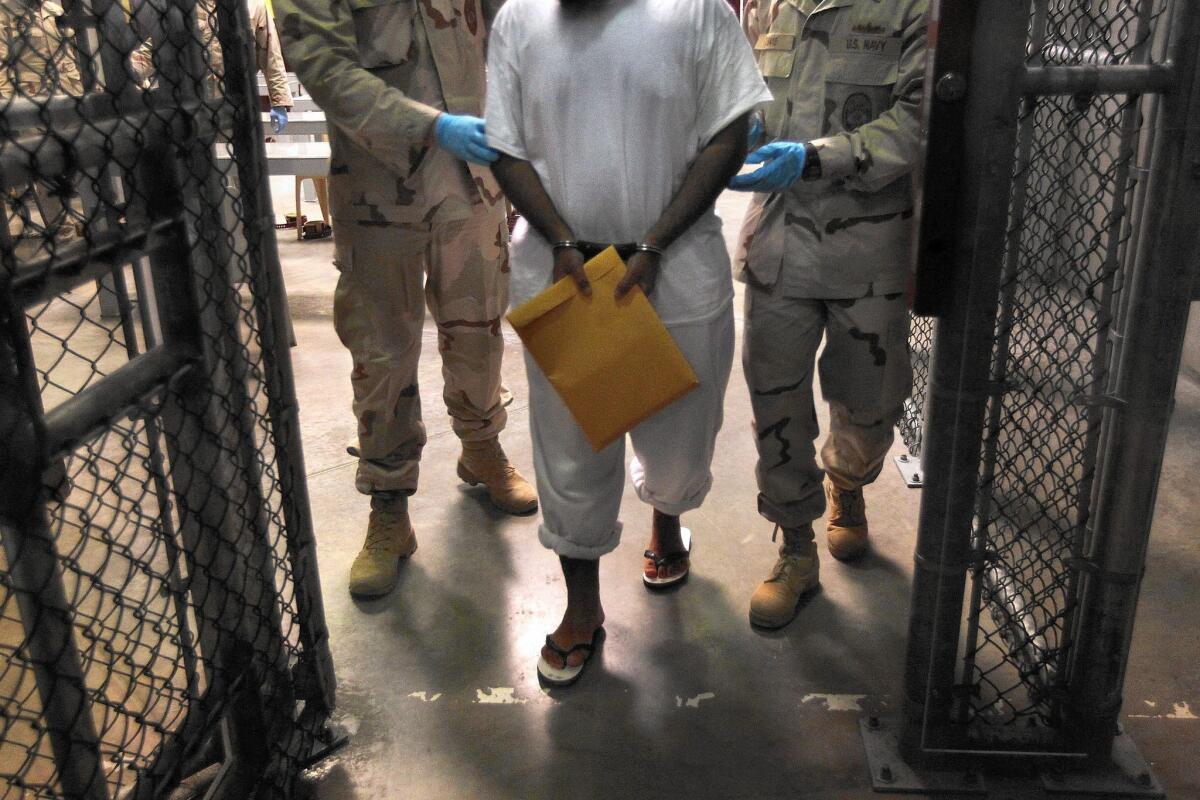Obama’s renewed push to close Guantanamo prison is seen as promising

President Obama has recharged his campaign for closing the Guantanamo Bay detention center with a strategy legal experts say holds out new hope of achieving that signature objective of his presidency.
After years of being thwarted by Congress from transferring detainees cleared of terrorism suspicions from the remote prison at the U.S. naval base in southern Cuba, the administration has in less than three months resettled 27 of the long-held foreign men in countries as far-flung as Estonia, Oman and Uruguay.
Dozens more are ready to be moved out as soon as other countries agree to take them, a diplomatic task that received an unexpected boost last month with an appeal by Pope Francis for predominantly Catholic nations to help empty the prison.
Obama has also spotlighted the staggering costs of maintaining the offshore detention operation — more than $3 million a year per detainee, by the Pentagon’s calculation — in his effort to counter Republican opposition to closing Guantanamo. And he has pointed out the failure of the U.S. military tribunal there to bring any of its most notorious terrorism suspects to justice.
Drawing down Guantanamo’s population from its current 122 — already fewer than half the 245 detainees Obama inherited from the Bush administration — is a key element of the president’s fresh push to deliver on the promise he made as a candidate to close Guantanamo within a year of taking office, lawyers and human rights advocates say.
A second crucial step needed to close the prison, they say, is moving the seven “high-value detainees” charged in major terrorism cases out of the dysfunctional military commissions and into U.S. courts.
Khalid Shaikh Mohammed, the self-confessed Sept. 11 mastermind, has been in U.S. custody for 12 years and at Guantanamo since 2006.
“It’s shocking that there is not more public pressure to try these people,” said Shayana Kadidal, senior managing attorney on the Guantanamo project at the Center for Constitutional Rights, a New York-based public interest law firm.
He was referring to the five men whose prosecution has been mired in pretrial challenges to the war court that rights advocates see as an end run around U.S. law. “If they had been brought to United States in 2009, those trials would be long over,” he said.
Obama has for years opposed indefinite detention at Guantanamo for the moral stain it has left on America’s reputation, but the money issue may offer better prospects for wearing down those opposed to closing the prison.
“It makes no sense to spend $3 million per prisoner to keep open a prison that the world condemns and terrorists use to recruit,” the president said during his State of the Union address Tuesday night. “It is not who we are. It is time to close Gitmo.”
In the 13 years since President George W. Bush created the prison and military tribunal, only eight militant foot soldiers from among the 780 men taken to Guantanamo have been tried and convicted, and only three of those remain at the prison to serve their terms.
Hundreds swept up in Afghanistan and Pakistan in the frenzied early days after the Sept. 11 attacks were years later deemed by military authorities to pose no threat to U.S. or allied security. But the releases slowed after reports emerged of some freed detainees joining Al Qaeda and other extremist groups.
The recidivism rate remains a topic of heated disagreement, with Republican lawmakers contending 30% of former captives are believed to have taken up with militant groups, and the administration saying the percentage is half that at most.
Obama’s first executive order after inauguration in January 2009 called for a six-agency task force review of all detainees and for decisions on whether they were to be prosecuted, deemed eligible for transfer or release, or categorized as “indefinite detainees” because of lingering suspicion but too little evidence to prove criminal acts.
Fifty-four prisoners still at Guantanamo were cleared for release by the task force in January 2010. Congress, in the meantime, had imposed a ban on detainee movements or relocation of terrorist trials to U.S. soil.
A slight easing of those restrictions took effect in late 2013, and State Department diplomats are intensively engaged in negotiating repatriation or resettlement, lawyers for some of the captives said.
But finding countries that will take in the detainees is a struggle, legal analysts say, pointing to the Bush-era condemnation of the prison’s residents as “the worst of the worst” militants on the planet.
An additional 35 prisoners remain at Guantanamo after being designated for indefinite detention, to be reconsidered annually by a multi-agency Periodic Review Board. That figure is down by at least two now after a Saudi and a Kuwaiti were lifted from the “forever prisoners” list and repatriated in November.
That contingent is the most problematic for Obama, as both Congress and rights groups supportive of closing Guantanamo object to administration proposals to bring them to some underused U.S. prison. The groups criticize the idea as simply transferring an illegal detention practice from Guantanamo to another venue.
Rights advocates, detainees’ lawyers and other critics of Obama’s failure to close Guantanamo have accused him of sacrificing that cause for other priorities, namely healthcare reform and economic crisis intervention during the first years of his administration. But even five years after the missed closure deadline, those critics say they are encouraged by the president’s resumed focus on ridding the nation — and his legacy — of the prison and war crimes tribunal.
“Privately, the level of commitment has been even more intense, as he is telling other officials that this is his top goal now and raising it with foreign leaders,” said Chris Anders, senior legislative counsel at the American Civil Liberties Union, who has monitored the legal battle over Guantanamo for a decade.
But closing Guantanamo will require Obama to expend political capital on the issue during his last two years in office, Anders said. Congress has tabled a bill that would impose new restrictions on Guantanamo releases.
Sen. Kelly Ayotte (R-N.H.), sponsor of the bill and one of Obama’s fiercest critics on the detention issue, recently said his administration “is more interested in emptying Guantanamo so that it can close it … than protecting the national security interests of the United States.”
“He’s going to have to take some unpopular steps if he wants to do this,” Anders said, including using his veto power to defeat tactics by opponents such as attaching riders to must-pass legislation such as the annual defense authorization bill.
Anders is also encouraged by the administration’s change in approach on the thorny problem of where to send dozens of Yemenis and other detainees cleared for release but unable to go back to their home countries.
Most of the 75 Yemenis at Guantanamo have been cleared, but U.S. authorities have been reluctant to send them home to a country engulfed in political chaos and increasingly under the sway of Yemen-based Al Qaeda in the Arabian Peninsula.
Among the 27 prisoners released since early November have been 12 Yemenis, all sent to other countries in apparent recognition that their homeland won’t be stable any time soon.
The quest for new havens for the releasable detainees got a lift last month when Francis appealed to diplomats at the Vatican to open their doors to those marooned at the prison because of turmoil in their homelands.
Cori Crider, an attorney with the British human rights group Reprieve and defense lawyer for several Guantanamo prisoners, accompanied six detainees in December on their journey to freedom in Uruguay, the first Latin American country to heed the pope’s moral intervention.
“That signal from the Vatican can only help. Other new states that hadn’t previously taken detainees have come forward,” Crider said.
“Hope springs eternal, even when it has been so disappointing previously,” she said of Obama’s recent revving up of the stalled closure effort.
“I don’t see closing Guantanamo as a light switch,” she said of an expected incremental process. “But every detainee that goes is a move away from this dark chapter.”
More to Read
Start your day right
Sign up for Essential California for news, features and recommendations from the L.A. Times and beyond in your inbox six days a week.
You may occasionally receive promotional content from the Los Angeles Times.







